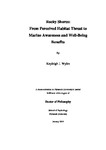Rocky Shores: From Habitat Threat to Marine Awareness & Well-Being Benefits
| dc.contributor.supervisor | Pahl, Sabine | |
| dc.contributor.author | Wyles, Kayleigh J. | |
| dc.contributor.other | School of Psychology | en_US |
| dc.date.accessioned | 2014-06-18T13:33:51Z | |
| dc.date.available | 2014-06-18T13:33:51Z | |
| dc.date.issued | 2014 | |
| dc.identifier | 10028226 | en_US |
| dc.identifier.uri | http://hdl.handle.net/10026.1/3038 | |
| dc.description | Chapter 3 is largely taken from a published paper: Wyles, K. J., Pahl, S., & Thompson, R. C. (2014). Perceived risks and benefits of recreational visits to the marine environment: Integrating impacts on the environment and impacts on the visitor. Ocean and Coastal Management, 88, 53-63 | en_US |
| dc.description.abstract |
Previous psychological research has demonstrated the benefits of visiting natural environments, especially coastal areas. However, research within Marine Biology has shown that such visits can harm natural habitats. Consequently, this thesis uses an integrative approach to examine both the risks to the environment and benefits to the human visitors in the context of rocky shores (intertidal areas where solid rock predominates). This was investigated using seven studies that involved a range of methods. Perception-based surveys (Studies 1 & 2) explored the perceived impacts on the visitor, and the potential impacts these visits can have on the rocky shore. Study 3 then examined the impacts on visitors’ well-being & marine awareness directly using a before-after survey on current visitors to two rocky shores. The most prominent habitat threat (leaving rubbish) was then examined in greater detail. Studies 4 and 5 examined the effects of marine litter on individuals’ well-being using two laboratory experimental designs; comparing individuals’ quantitative (Study 4) and qualitative (Study 5) responses to natural and littered shores. The final two studies then focused on an activity that reduces marine litter: Study 6 adopted a pre-post design to examine the benefits of engaging in beach cleans for current volunteers, whilst Study 7 used an experimental design comparing beach cleans with two other coastal activities on a more naïve sample. Overall, these studies provide evidence that experiencing rocky shores are beneficial for well-being and marine awareness. Counteracting such benefits, litter left behind after recreational visits were found to be detrimental to individuals’ well-being. As one potential solution to this issue, beach cleans were found to have the same, and additional beneficial effects on the individual as other coastal activities. Thus, activities which have a relatively positive impact on the environment can also have similar if not additional benefits to the visitor. This programme of research shows the importance of taking a holistic, integrative approach that takes into account both the risks to the environment and benefits to the individual resulting from recreational visits to natural environments. | en_US |
| dc.description.sponsorship | ESRC / NERC joint studentship | en_US |
| dc.language.iso | en | en_US |
| dc.publisher | Plymouth University | en_US |
| dc.subject | integrative | en_US |
| dc.subject | marine awareness | en_US |
| dc.subject | restorativeness | en_US |
| dc.subject | perceived habitat threat | en_US |
| dc.title | Rocky Shores: From Habitat Threat to Marine Awareness & Well-Being Benefits | en_US |
| dc.type | Thesis | |
| plymouth.version | Edited version | en_US |
| dc.identifier.doi | http://dx.doi.org/10.24382/4582 | |
| dc.identifier.doi | http://dx.doi.org/10.24382/4582 |
Files in this item
This item appears in the following Collection(s)
-
01 Research Theses Main Collection
Research Theses Main



